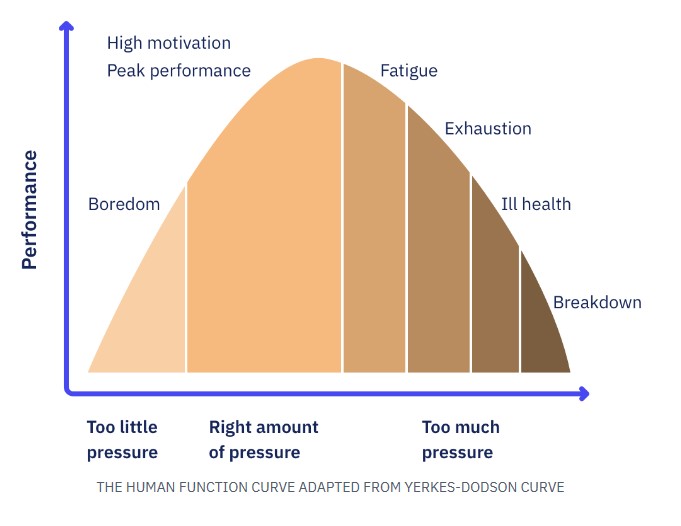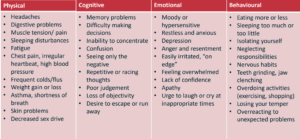What is Stress?

A simple way of explaining stress is that it involves being placed under some kind of pressure (real or perceived) and believing that we don’t have the abilities or resources to cope with the situation.
Stress is a normal part of life. It’s the body’s way of reacting to an environmental, emotional or mental challenge and it isn’t always bad.
A manageable level of stress can give you energy and motivation, improving our performance in activities like operational duties at work, sport or public speaking.
A lack of stress might feel great for a short period of time, like when we’re relaxing on holiday, but it can lead to boredom and fatigue if prolonged in the work environment.
However, if stress is ongoing or the stress response continues over a long period the effects can impact negatively on your physical and mental health.
-
How does it work?
In order for stress to occur there must be a stressor, which is usually some kind of external circumstance such as a work deadline or an important exam. The hormones that are triggered when you are feeling stressed are the same as those that trigger the body’s ‘fight or flight’ response when you feel threatened. It’s your body’s way of trying to protect you, by preparing you to react quickly.
-
Types of Stress
Eustress – also known as good stress as it has a positive and beneficial effect on our health, motivation, performance, and emotional well-being. For example when we start a new job or go on a rollercoaster.
Acute stress – is short-lived and is the kind of stress you experience in pressured situations such as exams, giving a speech or rushing to get to an appointment.
Chronic stress – occurs if the stress response continues after the threat has passed. In other words your body stays in ‘fight or flight’ mode continuously. It can also be the result of lots of stressors building up over time, never giving you a chance to recover.
Critical incident stress – is experienced after an event or series of events that are sudden, overwhelming, threatening or protracted. This may be an assault, threats, severe injury, death, fire or a bomb threat.
Post-traumatic stress – is a mental health condition that’s triggered by a terrifying event — either experiencing it or witnessing it. Symptoms may include flashbacks, nightmares and severe anxiety, as well as uncontrollable thoughts about the event
-
Signs and Symptoms of Stress

By Caraniche at Work -
What can I do about stress?
Remember: Stress is a biological response that is a normal part of our lives.
- Recognise you are feeling stressed
The first step is to identify that you are feeling stressed. You might notice your shoulders are tense most of the day, that you hold your breath or sigh a lot, or that your teeth are clenched and causing jaw pain. Developing an awareness of where you carry stress in your body can help you manage stress before it escalates. Mindfulness-based exercises and meditations can help with this. - Identify your stress triggers
Try to take stock of what creates stress in your life. You might notice that when you’re around certain people, doing specific tasks, or facing particular situations, your stress levels increase. Monitoring how your stress levels change over a week can be a good starting point to develop an awareness of your stress triggers. - Change the way you talk to yourself
Keeping things in perspective and accepting that you cannot control everything can help you manage stress. Ask yourself:
– Am I overestimating the likelihood of a negative outcome?
– Am I overestimating how bad the consequences will be?
– Am I underestimating my ability to cope?
– Is the stress within my control or outside of my control – focus your energy on what you can control and accept what you can’t.
– The Circle of Control and the Worry Tree are effective tools to assist with this. - Use problem-solving
Sometimes the situation causing the stress can be changed, for example, by getting an extension on work deadline, changing jobs, or sharing the workload with a colleague. Problem-solving involves identifying the problem causing stress, writing down a list of solutions, working through the pros and cons of each, selecting the best one and trying it out, and evaluating its success. - Keep things in perspective
When we are stressed, it is easy to see things as worse than they really are. Rather than imagining the worst-case scenario and then worrying about it, ask yourself:Am I overestimating the likelihood of a negative outcome? Am I overestimating how bad the consequences will be? Am I underestimating my ability to cope? - Rehearse tackling stressful situations
If there is a stressful event coming up, prepare for it. Work on developing the skills you need to tackle the situation as well as you can. Rehearse the situation before you have to perform on the actual day. This might include imagining yourself successfully handling the situation, or setting up real-life rehearsals. - Practise relaxation
Practising relaxation (such as autonomic relaxation, meditation or mindfulness) has been found to decrease stress. Meditation and relaxation techniques, if practised regularly, can help reduce stress levels by allowing the body and nervous system to settle and readjust to a calm state. - Organise your time
Research suggests that good time management can decrease stress, increase work and life satisfaction, and improve health. Time management strategies include setting goals, prioritising and planning tasks, writing to-do lists, using a diary, setting reminders for jobs that need doing, delegating tasks that can be done by others, and grouping similar jobs that can be done together. - Create a better work-life balance
People sometimes become stressed when they devote too much time and energy to one aspect of their life, at the expense of other important areas. Think about how satisfied you are with different life areas (e.g., relationships, work, recreation, health, exercise) and whether you are devoting the amount of attention you would like to each. If not, think about how you could improve your work-life balance, making more time for some, and putting boundaries around others. Taking time to wind down and enjoy relaxing activities is an important part of a balanced life and helps to reduce stress. Include relaxing activities such as gardening or reading, or activities you find uplifting such as listening to music, walking or dancing, in your daily or weekly routine.
- Recognise you are feeling stressed
-
Self-Care strategies
- Help seeking from colleagues, supervisors, counsellors, EAP
- Maintaining boundaries; act within your role
- Share your feelings in an appropriate setting – debrief
- Be aware of your reactions to confrontation and stress
- Learn how to best moderate/ address them
- Take proper work breaks; take time off
- Maintaining work-life balance; leave work at work!
- Learn and practice techniques to reduce arousal levels – Try these when feeling anxious or stressed:
- Stop and breathe before doing anything
- Take a time-out. Practice yoga, listen to music, meditate, get a massage, or learn relaxation techniques. Stepping back from the problem helps clear your head.
- Eat well-balanced meals. Do not skip any meals. Do keep healthful, energy-boosting snacks on hand.
- Limit alcohol and caffeine, which can aggravate stress and anxiety and trigger panic attacks.
- Get enough sleep. When stressed, your body needs additional sleep and rest.
- Exercise daily will help your body to recover from the increase of adrenaline and cortisol
- Take deep breaths. Inhale and exhale slowly.
- Count to 10 slowly. Repeat, and count to 20 if necessary.
- Do your best. Instead of aiming for perfection, which isn’t possible, be proud of however close you get.
- Welcome humour. A good laugh goes a long way.
- Maintain a positive attitude. Make an effort to replace negative thoughts with positive ones
-
Be careful of short term coping
- Increasing high sugar/salt/fat foods
- Switching from food to coffee
- A few extra wines after work
- Overworking
- “Stiff upper lip” – suppressing negative emotions and stress
- Withdrawal
- Complaining
- Sleeping in and “sickies’
-
Useful Resources
References:
Australian Psychological Society
Beyond blue & Psychology Tools UK
Bluespace Wellbeing
Caraniche at Work
Centre for Clinical Interventions (Government of WA)
